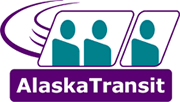Federal Transit Authority (FTA) Subrecipient Resources
Learn about Alaska construction career opportunities!
Alaska Construction Careers Day video highlighting careers & statistics.
All FTA Subrecipients through Alaska DOT&PF Alaska Community Transit are required under CFR 49 CFR 26 to include Disadvantaged Business Enterprises (DBEs) the maximum opportunity to complete for and perform contracts and subcontracts while utilizing FTA Funds.
All FTA subrecipients under the Alaska DOT&PF Alaska Community Transit, as mandated by 49 CFR Part 26 are obligated to incorporate Disadvantaged Business Enterprises (DBEs) in their procurement processes. The primary objective is to afford DBEs the utmost opportunity to actively compete for and engage in contracts and subcontracts funded by the Federal Transit Administration (FTA) within Alaska.
This regulatory framework is designed to promote diversity and inclusivity in the allocation of FTA funds, ensuring that businesses classified as DBEs have a fair chance to participate in the transportation-related projects. Subrecipients are expected to integrate measures that facilitate the involvement of DBEs in various stages of project development, procurement, and execution.
The inclusion of DBEs in contracting and subcontracting activities not only aligns with federal regulations but also contributes to fostering economic growth, job creation, and a more equitable distribution of opportunities within the Alaskan community. By adhering to these requirements, subrecipients play a vital role in advancing the overarching goals of promoting fair competition and reducing barriers for disadvantaged businesses in the transportation sector.
It is imperative for all stakeholders involved in FTA-funded projects to demonstrate a commitment to the principles outlined in 49 CFR Part 26, recognizing the significance of diversity and the value that DBEs bring to the overall success and sustainability of community transit initiatives in Alaska.
FTA Subrecipients are responsible for the following reporting requirements.
Uniform Report
FTA Subrecipients of Federal Transit Administration (FTA) funds must submit a semi-annual Uniform Report to the Alaska DOT&PF Civil Rights Office biannually. This reporting requirement serves a crucial purpose within the framework of Department of Transportation (DOT) funds recipients' responsibilities.
Recipients of FTA funds are expected to maintain accurate and detailed data pertaining to contracting opportunities made available to businesses funded through FTA dollars. The Uniform Report plays a pivotal role in ensuring compliance with Part 26 regulations. Failure to submit comprehensive contracting data related to the Disadvantaged Business Enterprise (DBE) program may lead to noncompliance with Part 26 standards.
The overarching objective of the Uniform Report is to capture and document information regarding the current actual payments made to DBEs for the work performed on ongoing federally-assisted contracts. By systematically recording these payments, the report provides a comprehensive snapshot of the utilization of DBEs in projects funded by the FTA, facilitating transparency, accountability, and adherence to the established regulatory framework. FTA Subrecipients play a vital role in upholding the integrity of the DBE program by diligently submitting accurate and timely reports, thereby contributing to the overall success of federally-assisted transportation initiatives.
Resources:
Reporting Period |
Due to Alaska DOT&PF Civil Rights Office |
December 1: April 1 – September 30 |
Due October 30th of every year |
June 1: October 1 – March 31 |
Due April 30th of every year |
Transit Vehicle Purchase
FTA Subrecipients receiving funds from the Federal Transit Administration (FTA) for the acquisition of vehicles or ferries intended for paratransit services are required report purchase information. FTA Subrecipients must submit Transit Vehicle Purchase information within 15 days from the date of the contract award.
It is important to note that the scope of paratransit extends beyond the mere purchase of vehicles; it encompasses the broader category of entities involved in the production of vehicles, which subsequently undergo post-production alterations or retrofitting to render them suitable for public transportation purposes. This includes modifications that make the vehicles accessible and accommodating for individuals with disabilities.
Furthermore, the definition of paratransit excludes businesses engaged in the manufacturing of vehicles exclusively for personal use or for sale "off the lot," as stipulated in 49 CFR 26.5. Therefore, entities focused on crafting vehicles for general consumer use, without customization for public transportation or specialized transit purposes, are not considered transit vehicle manufacturers under these regulations.
The reporting requirement aims to ensure transparency and accountability in the utilization of FTA funds for paratransit-related vehicle acquisitions. This process facilitates effective oversight, allowing regulatory bodies to monitor and verify that funds are allocated and used appropriately within the defined parameters of paratransit services. Compliance with these reporting guidelines is essential for subrecipients to uphold the standards and regulations set forth by the FTA.
Resources:
- FTA Subrecipient Transit Vehicle Purchase Survey
- FTA Subrecipient Transit Vehicle Purchase Instructions
Previous Meeting Presentations:
Helpful Resources:
Questions or concerns?
Email DOT.CRO.ProjectsDocs@alaska.gov or call 907-269-0846 to speak with Research Analyst II.

